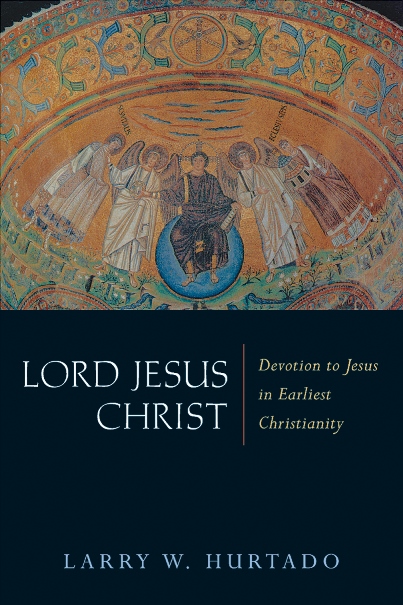Larry Hurtado: Lord Jesus Christ
 Larry W. Hurtado, Lord Jesus Christ: Devotion to Jesus in Earliest Christianity (Grand Rapids: Eerdmans, 2005), 746 pages, ISBN 9780802831675.
Larry W. Hurtado, Lord Jesus Christ: Devotion to Jesus in Earliest Christianity (Grand Rapids: Eerdmans, 2005), 746 pages, ISBN 9780802831675.
How is it that early Christians, who were mainly monotheistic Jews, showed such devotion, even worship, to Jesus Christ while still worshipping God in heaven? Larry Hurtado answers that question and more in this book and he does it in intricate, scholarly detail. In fact, Hurtado argues that this attitude towards Jesus stretches back to earliest Christianity in Jerusalem. This doctrine, this concept, he says, did not arise out of much later reflection and theological development, as some would argue.
He begins by setting his study in the context of first century Jewish monotheism, making it clear that generally the Jews of that time believed in one God and one God only. He then shows that from early on Christians, while still demonstrating devotion and worship to God in heaven, also demonstrated devotion and worship to Jesus Christ, a man dead but risen. In other words, these monotheistic Jews engaged in “binitarian” worship.
Hurtado examines Paul’s letters in chapter two, arguing that they are the earliest forms of Christian writing available to us. Hurtado notes that while Jewish critics of Paul’s ministry to the Gentiles complained about his mixing with Gentiles and his attitude to the Law, particularly his apparent rejection of circumcision, none seems to have complained about his using divine terms for this risen Jesus. Whilst arguments from silence can prove little or nothing, sometimes they carry weight, and this one, I believe, does that. The conclusion Hurtado draws is that the reason they did not reject Paul’s teaching on “devotion to Jesus” was because they too were teaching it and that even before Paul did. Indeed, Hurtado wonders whether this could be one of the reasons Paul originally so strongly opposed Christianity.
Even in Paul’s early writings “devotion to Christ is presupposed”. This would date its origins to not later than the 40s A.D. For example, in the first chapter of 1 Thessalonians (probably written in 50 A.D.) Paul speaks of “our Lord [kyrios] Jesus Christ” (v.3) and of God’s “Son from heaven … Jesus, who rescues us from the coming wrath” (vv.9-10). Scholars commonly regard Philippians 2:5-12, which begins “Christ Jesus, ‘Who, being in very nature God …’”, as an early Christian hymn that Paul uses in his letter. That hymn, if such it is, glorifies Christ in unmistakable terms. If that letter was written in about 60 A.D., as is commonly believed, then that hymn must have been composed earlier, perhaps much earlier.
In fact, this belief and its associated practices seem to have become common remarkably early in different Christian groups. Hurtado says, “for such a major cultic innovation to have so quickly become widespread, conventionalized, and uncontroversial among various Christian groups, it must necessarily have originated among one or more sufficiently influential, respected, and very early circle of believers.”
After looking at Paul’s letters Hurtado goes on to examine “Judean Jewish Christianity”, the synoptic Gospels, and then John’s Gospel. After that he looks at early Christian writings that are not part of Scripture, and in the process moves into the second century.
John’s Gospel is generally regarded as the last of the four Gospels to have been written, but it (or most of it, some would argue) was still written in the first century, so soon after the events it speaks of. Yet John’s Gospel has an undeniably high view of Jesus. A striking example of this is John’s frequent recording of “I am” (Gk. egō eimi) on the lips of Jesus, most significantly “before Abraham was born, I am!” (Jn. 8:58). Hurtado says, “this absolute use of ‘I am’ in the Gospels amounts to nothing less than designating Jesus with the same referential formula that is used in the Greek Old Testament for God’s own self-declaration.”
Strikingly, Hurtado also suggests that John’s portrayal of Jesus as the Word (logos) in his first chapter is not really connected with the Old Testament concept of wisdom, as is often suggested. Rather it is more related to “the name of God and the angel of the Lord” found in the Old Testament and later “Jewish traditions”.
Category: Church History, Spring 2016


